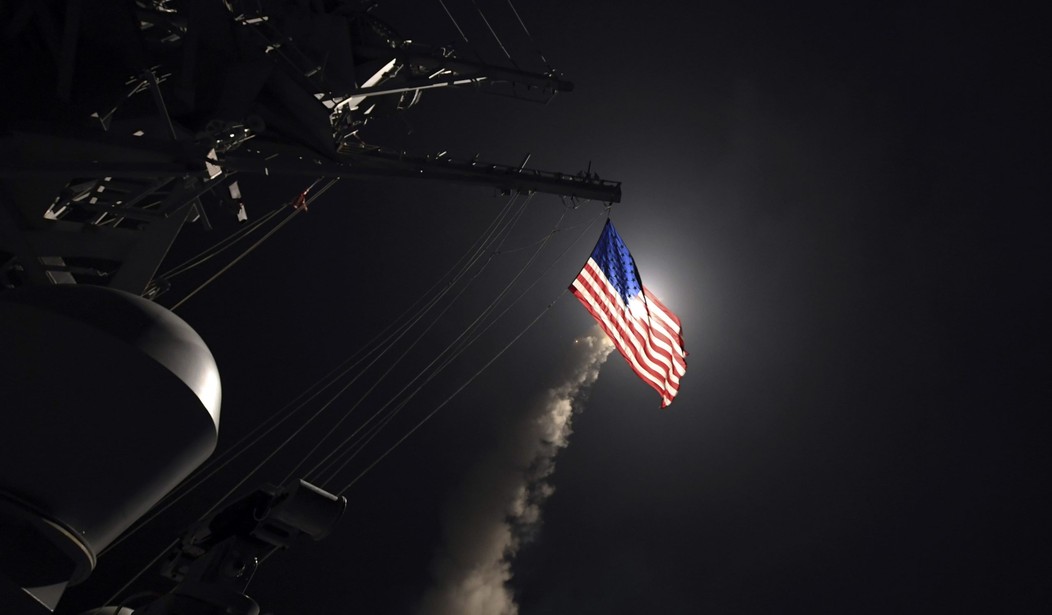Where is the Republican-controlled Congress on Syria? By all accounts, it is busy cheerleading the president’s firing of 59 Tomahawk missiles at a foreign sovereign — an offensive attack that was unprovoked and unauthorized by Congress, rendering it unconstitutional. With a Republican in the White House, though, Republicans on Capitol Hill are all for executive overreach, despite having spent the last eight years chiding a Democratic president’s excesses and Middle Eastern misadventures.
Of course, the bottom line is the same: Congress does nothing. But at least during the Obama years, legislative spinelessness was swaddled in righteous constitutional rhetoric. Now, lawmakers outright encourage presidential imperiousness and their own consequent irrelevance.
The Constitution vests in Congress the power to declare war — meaning the power to authorize military operations. The president may order the use of force unilaterally only when the United States is under attack, or at least the threat of attack. There was no such threat from the Syrian regime.
That makes Trump’s aggression unprovoked. Yet, Trump apologists claim that the use of chemical weapons by the despicable Assad — perhaps in collusion with his despicable Russian and Iranian enablers — is provocation enough. It is not. To be a provocation warranting unauthorized forcible retaliation, an attack must target the United States. Or, as someone once said: America First!
The Syrian atrocity — or should we say, the latest Syrian atrocity — had nothing to do with America. It was more internecine Islamic savagery. It was a case of a ruthless dictator in a barbaric civil war conducting yet another attack on his opposition, including the non-combatant civilians among whom that opposition hides. And as the Long War Journal’s Thomas Joscelyn reminds us in an essential report published by the Weekly Standard, Assad’s opposition includes al-Qaeda cells, Islamic State elements, and assorted Islamist militants. These factions are notorious for their own atrocities and desire to cleanse Syria of its Christian and other non-Islamic populations.
American troops are on the ground in Syria, coordinating coalition attacks on the anti-Assad jihadists. Assad, Russia, and their equally loathsome Iranian/Hezbollah allies are not targeting those Americans in Syria. Why would they?
While Assad & Co. avoid confrontation with American forces, Trump’s attack on Assad buoys the jihadists. It gives them hope that if they can hang in long enough, stave off the reluctant American intervention long enough, the new administration will engineer Assad’s removal from power — an intention Trump’s State Department is now signaling. That would pave the way for the jihadists to turn most of Syria into another of the Sunni sharia-supremacist basket-cases we’ve come to know so well — like Egypt while under Muslim Brotherhood-control, Afghanistan under Taliban domination, post-Qaddafi Libya, and other failed states whose ungovernable frontiers become safe havens for anti-American terrorism.
This is not to say that it would be completely irrational to hold, as progressives do, that the use of chemical weapons is so out-of-bounds barbaric that it demands a military response. I happen to think it’s a flawed theory (more on that later), but it’s a judgment call. The point is: If chemical weapons are not being used against the United States, it is not President Trump’s call to make. It is a question for Congress.
The further away an alien use of force gets from an attack or threat on the United States, the more essential it is that Congress be asked for authority to intervene forcibly. If an enemy strikes us, or at least credibly threatens to do so, there is no question about the legitimacy of our involvement in the conflict — we are necessarily involved. Once that happens, it is for the president, not Congress, to prosecute combat operations. If we have not been attacked or threatened, however, it is no more permissible for a president to inject us into a conflict than it would be for Congress to usurp executive power by purporting to give the commander-in-chief tactical directions.
It is up to our representatives on Capitol Hill to decide whether We the People want to make a conflict between foreign peoples our own — in this instance, a hopeless conflict that pits ruthless American enemies against each other.
Trump seems to believe that the use of chemical weapons justifies American acts of war against a foreign sovereign that has not threatened us — or at least that’s what he seems to believe after watching grisly news footage, rather than what he seemed to believe while delivering red-meat, no-more-Middle-East-wars stump speeches. If the Republican-controlled Congress believes it too, then the path forward is very simple: GOP leadership in the House and Senate should craft a resolution authorizing the use of force against Syria, or at the very least authorizing the president to respond with military force to any use of chemical weapons by Syria (or, by this logic, any other country).
But don’t hold your breath.
Note that while Assad has been gassing Syrians for years, Congress has authorized no military response. To be sure, there has been no shortage of bluster about Obama’s retreat from foolish red lines by the GOP’s hyper-interventionist McCain wing, which has never seen a jihadist who couldn’t be portrayed as a good guy or a bad guy — whatever is needed to rationalize American force, regardless of American interests. Yet, the Republican majority, even with some post-sovereign internationalist Democrats amenable to joining the McCain wing, has never dared authorize military operations on such grounds.
Why? Because they understand that the American people want no part of the Syrian conflict except to the extent necessary to deny jihadists the sanctuaries needed to plan attacks against America and the West.
Americans support humanitarian aid. They might even be persuaded to support militarily protected safe zones for displaced Syrians as an alternative to the ongoing refugee exodus to the West — at least if the heavy-lifting is done by our vaunted regional allies, with no open-ended commitment of U.S. troops. But Americans have no interest in sticking our young men and women between warring American enemies — especially warring American enemies who hate Americans even more than they despise each other.
In our constitutional system, doing your job means being accountable. Regarding Syria (as much else), the Republican Congress has never wanted to be accountable. On their watch, Capitol Hill has become the grandstands, from which there are catcalls or huzzahs depending on whether a president’s monarchical war-making looks like it will go well or badly wrong. So, for the moment anyway, Republicans are applauding Trump just as they trashed Obama. All the while, though, they hope you don’t notice that they have abdicated their duty to debate the wisdom of American interventions and conduct accountable votes on what kind of force, if any, should be employed.
In this, lawmakers fail the president as well as the nation. When Congress debates the use of force, its ultimate assent provides the president with vital political support when, inevitably, the going gets tougher than expected. And if Congress wavers or declines authorization, the president is given the opportunity and incentive to rethink what may be wayward policy.
The rationalizations for avoiding the Constitution’s dictates, offered by Trump boosters and self-proclaimed constitutionalists, are remarkably weak.
The claim that Trump needed the “element of surprise” and wants to be “unpredictable” would be hilarious were the matter not so deadly serious. Since the law is our norm, lawless attacks are unpredictable by nature — that does not make them legitimate. I’m quite sure Putin wanted the element of surprise in Georgia and Ukraine. And does anything say “unpredictable” quite like Pearl Harbor?
We condemn unprovoked aggression when it is done to us or to others because the aggressors are not entitled to the element of surprise. The norm we are supposed to be promoting is a predictable world order in which countries who are not at war with each other do not attack each other without cause and notice. Countries that do not comply with this norm are rightly considered rogues. That is not a club to which we should aspire.
Moreover, if Trump wanted the element of surprise, why were the Russians (and thus the Syrians and Iranians) warned that the attack was imminent? If the administration thought it was appropriate to alert our Russian, Iranian, and Syrian rivals that we were about to fire missiles at them, what would have been the problem with alerting Congress — i.e., with seeking authorization, consistent with the Constitution? Our enemies would then have been warned about our seriousness of purpose by a proper step, rather than an aggressive, unauthorized strike; yet the commander-in-chief would not have been saddled with a time-limit for conducting a lawful, authorized strike. That is, Trump could still have been “unpredictable,” attacking only if and when he decided the time was right. In the interim, his administration could have diplomatically confronted Russia, Syria, and Iran from a position of political strength.
Equally bogus is the contention that the War Powers Act validates Trump’s aggression. This provision, of highly dubious constitutionality in any event, is designed to curtail the president’s unilateral use of force once it is underway. The WPA does not legitimize the unilateral use of force; such an attack, in the absence of prior congressional authorization, can only be justified by an attack or threatened attack against the United States, our allies, or our interests. The notion that presidential war-making is validated by a statute aimed at restricting it is risible.
Finally, the fact that Assad’s use of chemical weapons violated international law does not legitimize Trump’s unauthorized military response. Many things violate international law. These transgressions do not sua sponte license retaliatory bombings. Under our law, they are grounds for seeking constitutional authority to use force. On the international stage, they are grounds for seeking a Security Council resolution supporting the responsive use of force. Here, there is no such resolution, and even if there were one, it would not substitute for compliance with the Constitution’s requirements.
There is no international treaty under which a country’s use of banned chemical weapons triggers an automatic, obligatory U.S. military response. Saddam Hussein was a serial international law violator who used chemical weapons against his own people in the course of violating over a dozen U.N. resolutions. The lawful response to this course of egregious conduct was to cite Saddam’s violations as a lawful basis for Congress to authorize an invasion of Iraq, not to invade without first asking Congress.
Let’s put the legal threshold for attacking to the side and consider the merits of the mission. President Trump maintains that a foreign dictator’s poisonous gas attack against non-combatants in his own country during a civil war warrants an American military response. It is a very unpersuasive claim — which may explain, at least in part, why he did not ask the Republican Congress to vote on it.
Targeting civilians with sarin gas is not materially worse than targeting them with conventional missiles, explosives, or guns. These cause just as much pain and suffering. In Syria, they have killed many more women, old people, toddlers, and “beautiful babies” than have chemical bombs. Even the Trump administration seems to realize this: witness spokesman Sean Spicer’s slip of the tongue in warning that the president might respond militarily not just to Assad’s chemical weapons but also to his use of “barrel bombs.” (Spicer has since backtracked — which is becoming his habitual gait.)
In any event, because we have not been attacked or threatened, it is for Congress, not Trump, to decide whether the Syrian regime’s chemical attack on Syrians is deserving of a responsive American act of war.
Naturally, Assad, Russia, and Iran responded to the U.S. attack on Syria’s war planes by attacking more targets said to be civilian. Are these civilian attacks immune from U.S. retaliation as long as the killing is done by conventional weapons? Is our new red line applicable to all chemical bombs, or is there an exemption for chlorine, a lethal gas (not as lethal as sarin) that Assad has used with some frequency? If, as President Trump says, Assad has now “crossed a lot of lines,” and if, as administration officials signal, the U.S. is now ready to push for his ouster, how deeply involved in Syrian combat is our government prepared to get? Since there is no moderate, pro-Western force capable of overthrowing Assad and overcoming the jihadists, what is the plan for replacing Assad? Are we prepared to confront Russia and Iran in order to bring about regime change? Are we prepared to keep forces in Syria to protect the successor regime — even if it is not pro-American?
These are the Republican-controlled Congress should be considering. Alas, the Republican-controlled Congress is AWOL.









Join the conversation as a VIP Member